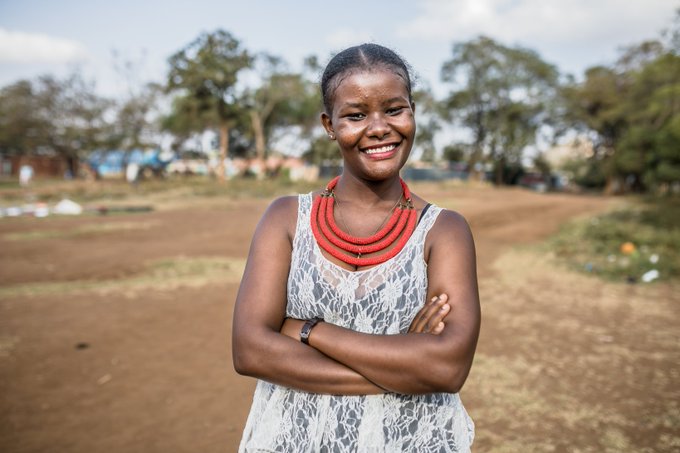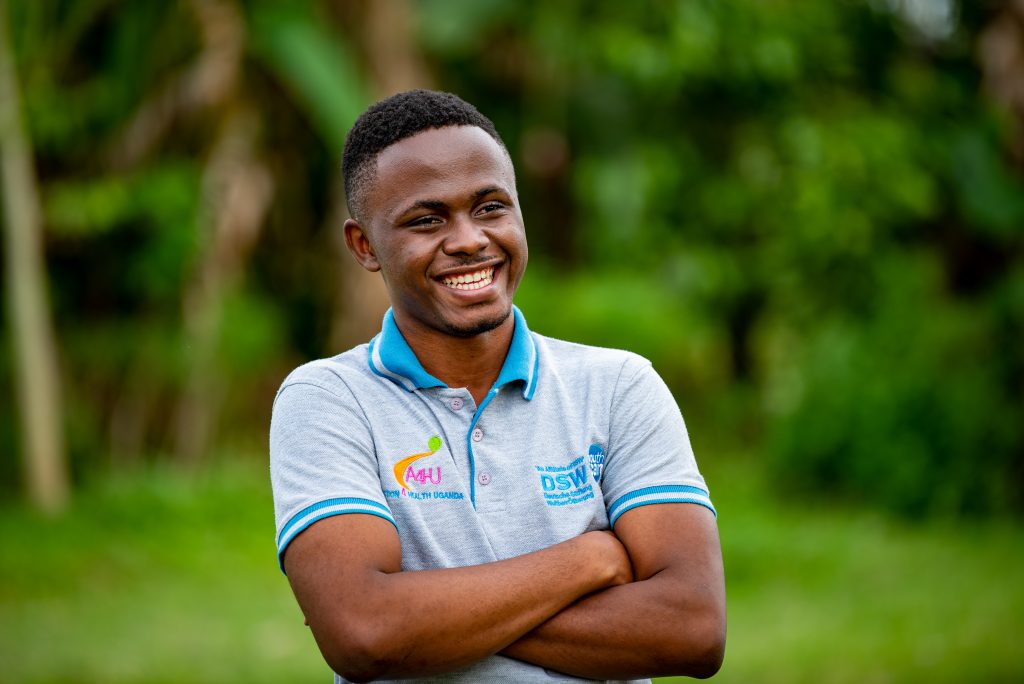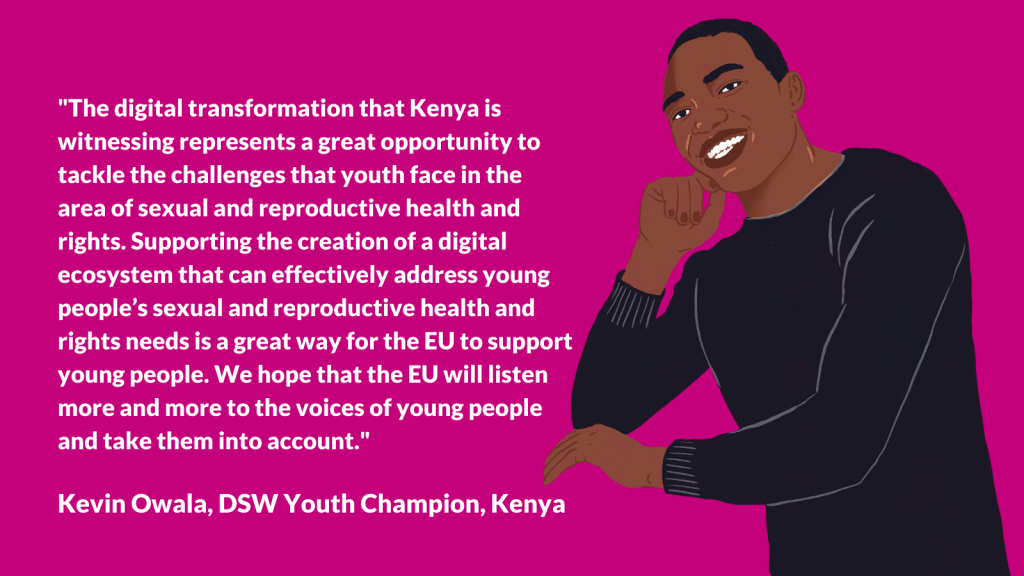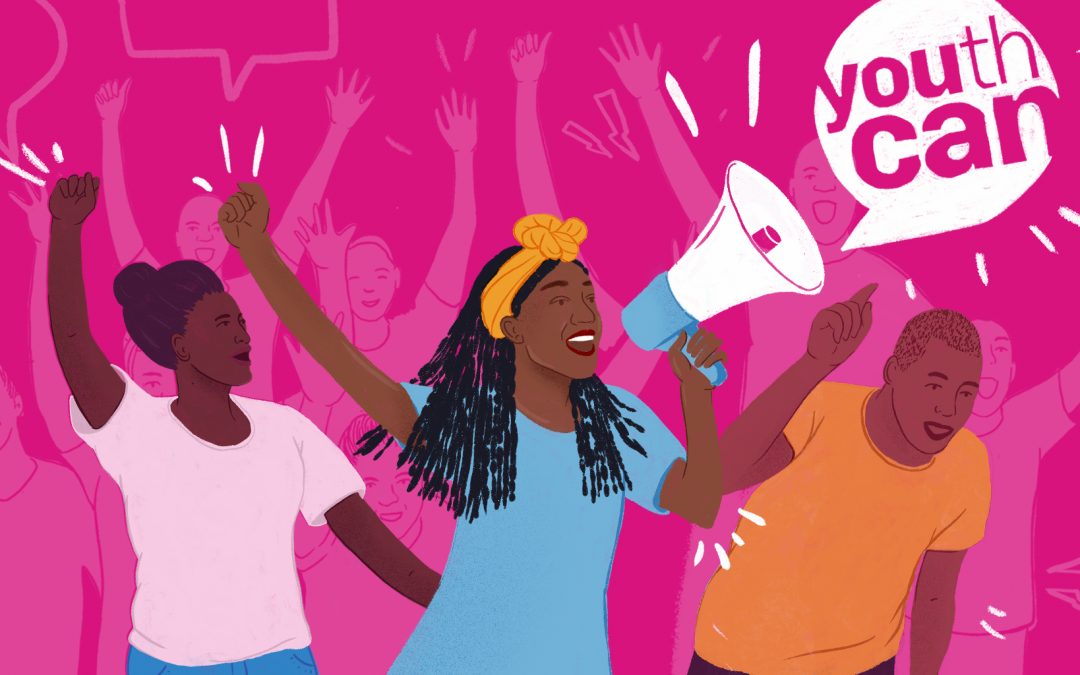The theme of International Youth Day 2021 focuses on youth innovation for human and planetary health. As described by António Guterres, UN Secretary-General; “Young people are on the frontlines of the struggle to build a better future for all. The COVID-19 pandemic has highlighted the dire need for the kind of transformational change they seek – and young people must be full partners in that effort.” We couldn’t agree more.
One of the areas of health most severely impacted by the COVID-19 pandemic was sexual and reproductive health (SRH) services, with the United Nations Population Fund (UNFPA) estimating the pandemic disrupted contraceptive use for about 12 million women with a consequence of nearly 1.4 million unintended pregnancies during 2020 across 115 low- and middle-income countries.

Mercy Kioko, a DSW Youth Champion in the northwest of Kenya.
In Kenya, curfews catalysed the use of digital platforms among young people to access SRH services. Mercy Kioko, a DSW Youth Champion in the northwest of Kenya explained; “In the town of Eldoret, the Rafiki Youth Friendly Centre is the preferred source for SRHR information by young people. Before the COVID-19 pandemic, around 102 youth were visiting and accessing its services daily. During the COVID-19 pandemic, this figure dropped to 40. Restrictions to movements due to COVID-19 became a barrier to young people accessing SRHR services, preventing them from accessing reproductive health services at the health facilities. Youth champions from Uasin Gishu decided to use social media and radio sessions to reach out to youth during COVID-19 times, providing SRHR information, with some youth online talk shows reaching over 500 young people.”
Youth-led digital innovation
Digital tools can play an essential role in increasing access to reliable, factual information on issues related to SRHR services. For example, digital applications have been developed to tackle issues ranging from delivering vital health information to pregnant women and girls to reporting instances of sexual and gender-based violence (SGBV).
One example is SafePal, a mobile application designed by youth in Uganda in 2015 to enable young people, girls, in particular, to anonymously report episodes of sexual violence, helping to reduce the time gap between reporting and intervention through quick referrals.
Uganda currently has the second youngest population in the world; over 78 percent of its 41.6 million citizens are under 30 years old. Young adolescents in Uganda continue to face numerous sexual and reproductive health challenges, including high prevalence of HIV and AIDS (with adolescent girls accounting for 66% of all the new HIV infections), and reproductive health complications, like unsafe abortions, high mortality rates, and fistula posing a heavy burden on young people.
John Jessy, a DSW/ Action 4 Health Youth Champion from the Mukono district of Uganda stressed, “Our voices and innovative ideas as young people should be prioritised, understood and honest opinions implemented not only on health but in all developmental aspects affecting young people as well.”
Closing the digital gender divide
While digitising SRHR services and information provides huge opportunities, it is not without challenges. In least developed countries, only around 54% of women use mobile internet, with women also 20% less likely to own a smartphone, compared to men. In Kenya, a significant digital gender gap is looming, with 34% of young women and girls less likely to have access to mobile internet than men and boys.
This Countdown 2030 video developed by DSW with IPPF explores how digitalisation and sexual and reproductive health and rights can strengthen one another, presenting amazing opportunities for health and empowerment around the world.
Mercy added that youth are facing many challenges to accessing information digitally, including difficulties in accessing quality digital devices and poor connectivity. Furthermore, Milka Rop, a DSW Youth Champion from West Pokot in Kenya added that, “despite social media potentially being a very helpful digital tool, it also comes with challenges, especially linked with online sexual harassment. This is why it is important to create digital platforms which provide accurate and accessible information on SRHR to young people.’’
The full benefits from digitalisation can be hampered by several challenges, including low digital literacy, inadequate funding for innovations, poor internet connectivity and a weak regulatory framework, which continue to impede access to adequate and reliable SRHR information and services in the digital space.
How to promote an inclusive digital SRHR agenda?
The digital transformation represents a great opportunity to tackle the challenges that young people face in the area of SRHR, allowing young people to lead healthy and self-determined lives. Here are some ideas and calls to action from DSW Youth Champions on how to promote an inclusive digital SRHR agenda:
Merci says, “The Kenyan Government should support developing digital platforms where youth can access reliable information on SRHR and be able to connect with service providers.”

John Jessy, a DSW/ Action 4 Health Youth Champion from the Mukono district of Uganda.
John Jessy added, “The increased usage of the internet globally is a good indicator that sexual and reproductive health and rights information can be passed on to large numbers through the internet but the information at present is not organised. That’s why I’d propose the creation of a ‘SRHRWiki’, a ‘Wikipedia’ including all information regarding SRHR, packaged in a youth-friendly and inclusive way, with lots of videos and voice recordings developed by young people, SRHR and development partners”.
Referring to Kenya’s digital revolution, Kevin Owala, a DSW Youth Champion from Trans Nzoia County in Kenya stated, “supporting the creation of a digital ecosystem that can effectively address young people’s sexual and reproductive health and rights needs is a great way for the EU to support young people”, adding “we hope that the EU will listen more and more to the voices of young people and take them into account”.

Furthermore, DSW developed some recommendations as to how the EU in Kenya could grasp the digital transformation and support the realisation of young people’s vision for a world where young people can fulfill their potential:
- The EU should partner with governments to strengthen health systems, including the e-health sector, by developing tools that can respond to young people’s health needs.
- When supporting the digital transformation, the EU should pay particular attention to supporting efforts to close the digital gender gap.
- EU Delegations should establish mechanisms to meaningfully engage young people, so as to take into account youth voices and views on matters that are important to them.
Given that the principle of nondiscrimination is central to accessing SRHR, empowering all young people, including women and girls with accurate information on safe, effective, affordable and acceptable contraception methods of their choice remains critical. For this reason, DSW is committed to digitalising SRHR information and calls on the EU to support such efforts.
DSW and Action 4 Health Uganda have also developed concrete recommendations on how the EU could support youth empowerment in Uganda, promoting access to SRHR for all young people.

